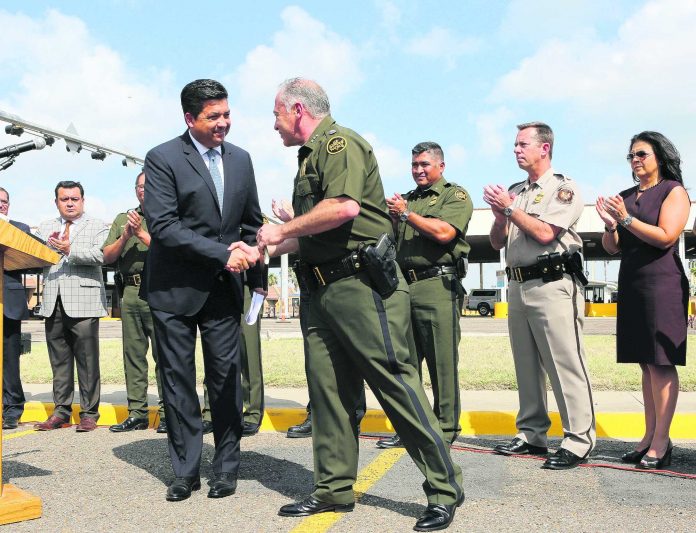
By MARK STEVENSON
Associated Press
MEXICO CITY (AP) — Mexico has made little headway defusing a bizarre standoff over the possible arrest of a a sitting state governor facing charges of tax evasion, money laundering and organized crime.
But President Andrés Manuel López Obrador made one thing clear Thursday: Any diplomatic documents the United States sends to Mexico are at risk of being published by the president himself.
So eager is López Obrador to see the governor arrested that he displayed a copy of a May 4 letter sent by the U.S. Embassy’s legal attaché asking for information on Garcia Cabeza de Vaca as part of a U.S. money laundering investigation.
And the president said he’d do it again, even though such documents might contain sensitive information.
“Just so everyone knows, if my administration gets a document, with all the implications it might have … independently of whether it legally correct or not, I am going to make public right now a letter sent by the United States Embassy,” the president said at his daily morning press conference.
Mexico is already facing questions about the clarity of its legal system, and doubts about whether the U.S. can continue to share intelligence with Mexican officials. But this week’s dispute over border state Gov. Francisco Garcia Cabeza de Vaca threatens to do damage on both fronts.
A disagreement between courts, prosecutors and state and federal legislatures make it unclear whether the Tamaulipas state governor can be arrested, or whether he still enjoys immunity from prosecution as an elected official.
The federal Congress dominated by the president’s Morena party has voted to remove his immunity. The state legislature dominated by the opposition refused to recognize that, and the Supreme Court has refused to step into the dispute.
It raises the possibility that if Garcia Cabeza de Vaca leaves Tamaulipas, he might face arrest; or if federal agents try to arrest him inside Tamaulipas, they could face resistance from the sizable state police force.
López Obrador suggested on Thursday drawing a fourth entity, the Senate, into the dispute, although its powers in this case are also unclear.
Federal prosecutors said Wednesday they had obtained an arrest warrant and the governor’s bank accounts have been frozen.
The governor is a prominent figure in Mexico’s embattled conservative opposition, which claims the charges against him amount to political persecution. López Obrador says it is a classic case of the corruption he has promised to root out.
But publishing the U.S. request for legal assistance takes the dispute to a new level.
Despite diplomatic protocols that usually regard such letters as confidential — and Mexico’s own confidentiality laws that prohibit naming suspects unless they are convicted.
Along with the governor, the letter named at least 20 other individuals and companies, though it is unclear whether they have been charged. Technically in Mexico, releasing files from an ongoing case or investigation is itself a crime.
The president acknowledged that his own legal team had previously discouraged him from releasing such files, but said he had to do it to avoid Mexico becoming “the laughingstock” of other nations for not doing enough to combat money laundering.
López Obrador has published sensitive U.S. documents in the past.
In January, he ordered the publication of 751 pages of a case file received from the United States against Mexico’s former defense secretary, Gen. Salvador Cienfuegos Zepeda, whom U.S. prosecutors had charged with drug trafficking. All of the pages were marked: “Shared per court order, not for further distribution.”
In that case. López Obrador accused the U.S. Drug Enforcement Administration of fabricating the accusations and displaying a lack of professionalism in their investigation.
Under the pressure of Mexico’s implicit threats to restrict or expel U.S. agents, U.S. prosecutors dropped their case so Cienfuegos could be returned to Mexico and investigated under Mexican law. Mexico quickly dropped the investigation with no charges.
Even though the U.S. yielded on Cienfuegos, Mexico’s Congress a few weeks later passed a law that restricts U.S. agents in Mexico and removed their diplomatic immunity.
Experts say those restrictions could sour the security relationship with the United States, which provides much of Mexico’s intelligence on drug trafficking and money laundering cases.
López Obrador has been angered because past corruption cases usually wind up getting prosecuted, if at all, in the United States, which is where corrupt politicians in Mexico usually store their cash. That also means U.S. prosecutors get to keep any seized cash, something that really angers López Obrador.
Several former Tamaulipas governors have faced corruption charges. Organized crime groups have long had deep roots in the state and numerous politicians have been implicated in dealings with them.
Former Gov. Tomás Yarrington of the Institutional Revolutionary Party was extradited to the U.S. from Italy in 2018 to face drug trafficking charges. U.S. officials also have tried to extradite the governor who succeeded Yarrington in 2005, Eugenio Hernández, to face money laundering charges.
Federal prosecutors claim Garcia Cabeza de Vaca owns a large number of luxury properties that it says don’t jibe with the income from his government jobs over the last 20 years.
Mexico’s agency for curbing money laundering, the Financial Intelligence Unit, said in a report to Congress earlier this year that Garcia Cabeza de Vaca earned about $2 million in wages and $1 million in other income since 2000, but acquired properties worth many times that. It also mentioned properties owned by the governor or his relatives in Texas.
In a video in March, the governor said “None of the homes that were shown in the report belong to me,” adding “I have no links to organized crime.”



















